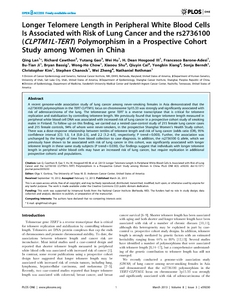Lan, Q;
Cawthon, R;
Gao, Y;
Hu, W;
Hosgood, HD;
Barone-Adesi, F;
Ji, BT;
Bassig, B;
Chow, WH;
Shu, X;
et al.
Lan, Q; Cawthon, R; Gao, Y; Hu, W; Hosgood, HD; Barone-Adesi, F; Ji, BT; Bassig, B; Chow, WH; Shu, X; Cai, Q; Xiang, Y; Berndt, S; Kim, C; Chanock, S; Zheng, W; Rothman, N
(2013)
Longer telomere length in peripheral white blood cells is associated with risk of lung cancer and the rs2736100 (CLPTM1L-TERT) polymorphism in a prospective cohort study among women in China.
PLOS ONE, 8 (3).
e59230.
ISSN 1932-6203
https://doi.org/10.1371/journal.pone.0059230
SGUL Authors: Barone-Adesi, Francesco
![[img]](https://openaccess.sgul.ac.uk/101313/1.hassmallThumbnailVersion/pone.0059230.pdf)  Preview |
|
["document_typename_application/pdf; charset=binary" not defined]
Published Version
Download (155kB)
| Preview
|
Abstract
A recent genome-wide association study of lung cancer among never-smoking females in Asia demonstrated that the rs2736100 polymorphism in the TERT-CLPTM1L locus on chromosome 5p15.33 was strongly and significantly associated with risk of adenocarcinoma of the lung. The telomerase gene TERT is a reverse transcriptase that is critical for telomere replication and stabilization by controlling telomere length. We previously found that longer telomere length measured in peripheral white blood cell DNA was associated with increased risk of lung cancer in a prospective cohort study of smoking males in Finland. To follow up on this finding, we carried out a nested case-control study of 215 female lung cancer cases and 215 female controls, 94% of whom were never-smokers, in the prospective Shanghai Women's Health Study cohort. There was a dose-response relationship between tertiles of telomere length and risk of lung cancer (odds ratio (OR), 95% confidence interval [CI]: 1.0, 1.4 [0.8-2.5], and 2.2 [1.2-4.0], respectively; P trend = 0.003). Further, the association was unchanged by the length of time from blood collection to case diagnosis. In addition, the rs2736100 G allele, which we previously have shown to be associated with risk of lung cancer in this cohort, was significantly associated with longer telomere length in these same study subjects (P trend = 0.030). Our findings suggest that individuals with longer telomere length in peripheral white blood cells may have an increased risk of lung cancer, but require replication in additional prospective cohorts and populations.
Statistics
Item downloaded times since 04 Jul 2013.
Actions (login required)
 |
Edit Item |




